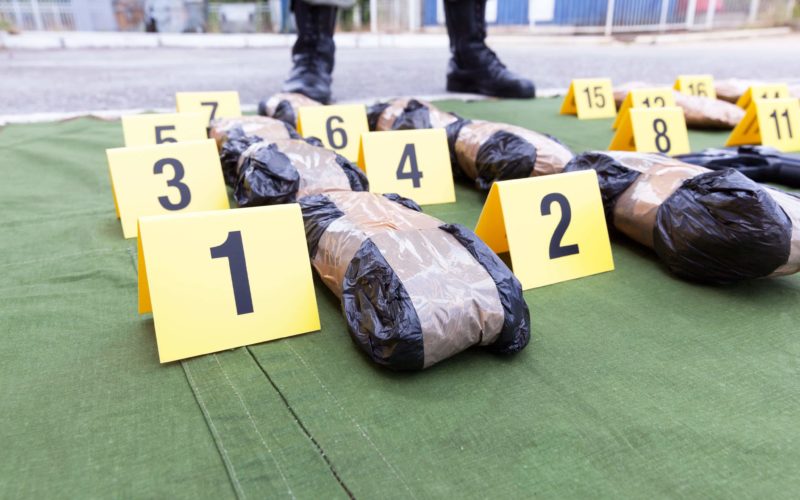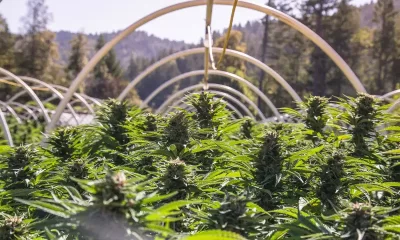Business
California Department of Cannabis Announces Seizure of $1 Billion in Illegal Pot This Past Year

The California Department of Cannabis Control (DCC) released an updated announcement about search warrants conducted and illegal cannabis product collected over the last year.
The DCC announced on Aug. 25 that it has officially seized more than $1 billion worth of illegal cannabis. The department attributes this milestone to recent raids conducted in Los Angeles and Riverside County within the past year.
“This important milestone was reached through close collaboration with local, state, and federal partners and furthers California’s efforts to go after activities that harm communities and the environment, including water theft, threats of violence, elder abuse, and human trafficking to name a few,” the DCC wrote in a press release. “These operations and the products they produce threaten consumer safety and the vitality of legal and compliant licensees.”
The agency described that over the last 13 months, it participated in 232 search warrants (either led by the DCC, or in partnership with other agencies). Those searches yielded over half a million pounds of “illegal product,” along with 1.4 million cannabis plants “eradicated.” It also explains that these efforts have “removed more than $1 billion worth of potentially harmful and often untested cannabis products from the market,” in addition to 120 illegal firearms, and $2.3 million in “illegally obtained assets.”
The DCC also explains that it is taking measures to ensure that consumers remain safe. “In tandem with law enforcement actions that crack down on illegal activity, DCC staff are working to expand access to tested cannabis products for consumers and lower barriers of participation for businesses,” it wrote in the announcement. “This includes a recent allocation of $20 million to DCC to grant cities and counties with funding that will support the creation of cannabis retail access in areas that currently do not allow it.”
In March, the DCC introduced new changes to state cannabis regulations to “streamline and simplify” existing rules. “This proposal is a direct result of DCC’s engagement with stakeholders and the thoughtful feedback received through letters, conversations, meetings and previous rulemaking processes,” said DCC Director Nicole Elliott. “We are deeply [committed] to creating a cannabis regulatory structure that works for all Californians, including California’s cannabis industry, consumers and communities.” Topics such as video surveillance, live cannabis plant sales, certificates of analysis and more were addressed.
In July, the DCC announced its projection to seize more than $1 billion in illegal cannabis products. At the time, the agency had participated in 208 search warrants, had removed 1.38 million plants, and seized more than half a million pounds of “illegal product.”
On Aug. 29, the DCC announced that it will be holding a virtual meeting on Sept. 8 to discuss how a recent $20 million grant will be allocated to expand consumer access to legal cannabis dispensaries across the state. It’s the first meeting to include the Cannabis Advisory Committee (CAC), which is tasked with providing feedback to the DCC’s regulations through public discussion. The members of which were appointed on Aug. 1 and include a total of 17 individuals, chosen out of a pool of 300 applicants. “Pursuant to Division 10 of the Business and Professions Code, the CAC is tasked with advising DCC on the development of relevant standards and regulations for commercial cannabis businesses, including those necessary to protect public health and safety. Key to the CAC’s work will be to ensure DCC is working to create regulations for commercial cannabis activity that helps protect public health and safety while decreasing burdens for legal operators and reducing the illicit market.”
The first meeting will introduce the CAC members, debut a presentation about plans for 2023, and make time for public comment.
Business
New Mexico cannabis operator fined, loses license for alleged BioTrack fraud

New Mexico regulators fined a cannabis operator nearly $300,000 and revoked its license after the company allegedly created fake reports in the state’s traceability software.
The New Mexico Cannabis Control Division (CCD) accused marijuana manufacturer and retailer Golden Roots of 11 violations, according to Albuquerque Business First.
Golden Roots operates the The Cannabis Revolution Dispensary.
The majority of the violations are related to the Albuquerque company’s improper use of BioTrack, which has been New Mexico’s track-and-trace vendor since 2015.
The CCD alleges Golden Roots reported marijuana production only two months after it had received its vertically integrated license, according to Albuquerque Business First.
Because cannabis takes longer than two months to be cultivated, the CCD was suspicious of the report.
After inspecting the company’s premises, the CCD alleged Golden Roots reported cultivation, transportation and sales in BioTrack but wasn’t able to provide officers who inspected the site evidence that the operator was cultivating cannabis.
In April, the CCD revoked Golden Roots’ license and issued a $10,000 fine, according to the news outlet.
The company requested a hearing, which the regulator scheduled for Sept. 1.
At the hearing, the CCD testified that the company’s dried-cannabis weights in BioTrack were suspicious because they didn’t seem to accurately reflect how much weight marijuana loses as it dries.
Company employees also poorly accounted for why they were making adjustments in the system of up to 24 pounds of cannabis, making comments such as “bad” or “mistake” in the software, Albuquerque Business First reported.
Golden Roots was fined $298,972.05 – the amount regulators allege the company made selling products that weren’t properly accounted for in BioTrack.
The CCD has been cracking down on cannabis operators accused of selling products procured from out-of-state or not grown legally:
- Regulators alleged in August that Albuquerque dispensary Sawmill Sweet Leaf sold out-of-state products and didn’t have a license for extraction.
- Paradise Exotics Distro lost its license in July after regulators alleged the company sold products made in California.
Golden Roots was the first alleged rulebreaker in New Mexico to be asked to pay a large fine.
Source: https://mjbizdaily.com/new-mexico-cannabis-operator-fined-loses-license-for-alleged-biotrack-fraud/
Business
Marijuana companies suing US attorney general in federal prohibition challenge

Four marijuana companies, including a multistate operator, have filed a lawsuit against U.S. Attorney General Merrick Garland in which they allege the federal MJ prohibition under the Controlled Substances Act is no longer constitutional.
According to the complaint, filed Thursday in U.S. District Court in Massachusetts, retailer Canna Provisions, Treevit delivery service CEO Gyasi Sellers, cultivator Wiseacre Farm and MSO Verano Holdings Corp. are all harmed by “the federal government’s unconstitutional ban on cultivating, manufacturing, distributing, or possessing intrastate marijuana.”
Verano is headquartered in Chicago but has operations in Massachusetts; the other three operators are based in Massachusetts.
The lawsuit seeks a ruling that the “Controlled Substances Act is unconstitutional as applied to the intrastate cultivation, manufacture, possession, and distribution of marijuana pursuant to state law.”
The companies want the case to go before the U.S. Supreme Court.
They hired prominent law firm Boies Schiller Flexner to represent them.
The New York-based firm’s principal is David Boies, whose former clients include Microsoft, former presidential candidate Al Gore and Elizabeth Holmes’ disgraced startup Theranos.
Similar challenges to the federal Controlled Substances Act (CSA) have failed.
One such challenge led to a landmark Supreme Court decision in 2005.
In Gonzalez vs. Raich, the highest court in the United States ruled in a 6-3 decision that the commerce clause of the U.S. Constitution gave Congress the power to outlaw marijuana federally, even though state laws allow the cultivation and sale of cannabis.
In the 18 years since that ruling, 23 states and the District of Columbia have legalized adult-use marijuana and the federal government has allowed a multibillion-dollar cannabis industry to thrive.
Since both Congress and the U.S. Department of Justice, currently headed by Garland, have declined to intervene in state-licensed marijuana markets, the key facts that led to the Supreme Court’s 2005 ruling “no longer apply,” Boies said in a statement Thursday.
“The Supreme Court has since made clear that the federal government lacks the authority to regulate purely intrastate commerce,” Boies said.
“Moreover, the facts on which those precedents are based are no longer true.”
Verano President Darren Weiss said in a statement the company is “prepared to bring this case all the way to the Supreme Court in order to align federal law with how Congress has acted for years.”
While the Biden administration’s push to reschedule marijuana would help solve marijuana operators’ federal tax woes, neither rescheduling nor modest Congressional reforms such as the SAFER Banking Act “solve the fundamental issue,” Weiss added.
“The application of the CSA to lawful state-run cannabis business is an unconstitutional overreach on state sovereignty that has led to decades of harm, failed businesses, lost jobs, and unsafe working conditions.”
Business
Alabama to make another attempt Dec. 1 to award medical cannabis licenses

Alabama regulators are targeting Dec. 1 to award the first batch of medical cannabis business licenses after the agency’s first two attempts were scrapped because of scoring errors and litigation.
The first licenses will be awarded to individual cultivators, delivery providers, processors, dispensaries and state testing labs, according to the Alabama Medical Cannabis Commission (AMCC).
Then, on Dec. 12, the AMCC will award licenses for vertically integrated operations, a designation set primarily for multistate operators.
Licenses are expected to be handed out 28 days after they have been awarded, so MMJ production could begin in early January, according to the Alabama Daily News.
That means MMJ products could be available for patients around early March, an AMCC spokesperson told the media outlet.
Regulators initially awarded 21 business licenses in June, only to void them after applicants alleged inconsistencies with how the applications were scored.
Then, in August, the state awarded 24 different licenses – 19 went to June recipients – only to reverse themselves again and scratch those licenses after spurned applicants filed lawsuits.
A state judge dismissed a lawsuit filed by Chicago-based MSO Verano Holdings Corp., but another lawsuit is pending.
Source: https://mjbizdaily.com/alabama-plans-to-award-medical-cannabis-licenses-dec-1/
-

 Business2 years ago
Business2 years agoPot Odor Does Not Justify Probable Cause for Vehicle Searches, Minnesota Court Affirms
-

 Business2 years ago
Business2 years agoNew Mexico cannabis operator fined, loses license for alleged BioTrack fraud
-

 Business2 years ago
Business2 years agoAlabama to make another attempt Dec. 1 to award medical cannabis licenses
-

 Business2 years ago
Business2 years agoWashington State Pays Out $9.4 Million in Refunds Relating to Drug Convictions
-

 Business2 years ago
Business2 years agoMarijuana companies suing US attorney general in federal prohibition challenge
-

 Business2 years ago
Business2 years agoLegal Marijuana Handed A Nothing Burger From NY State
-

 Business2 years ago
Business2 years agoCan Cannabis Help Seasonal Depression
-

 Blogs2 years ago
Blogs2 years agoCannabis Art Is Flourishing On Etsy













